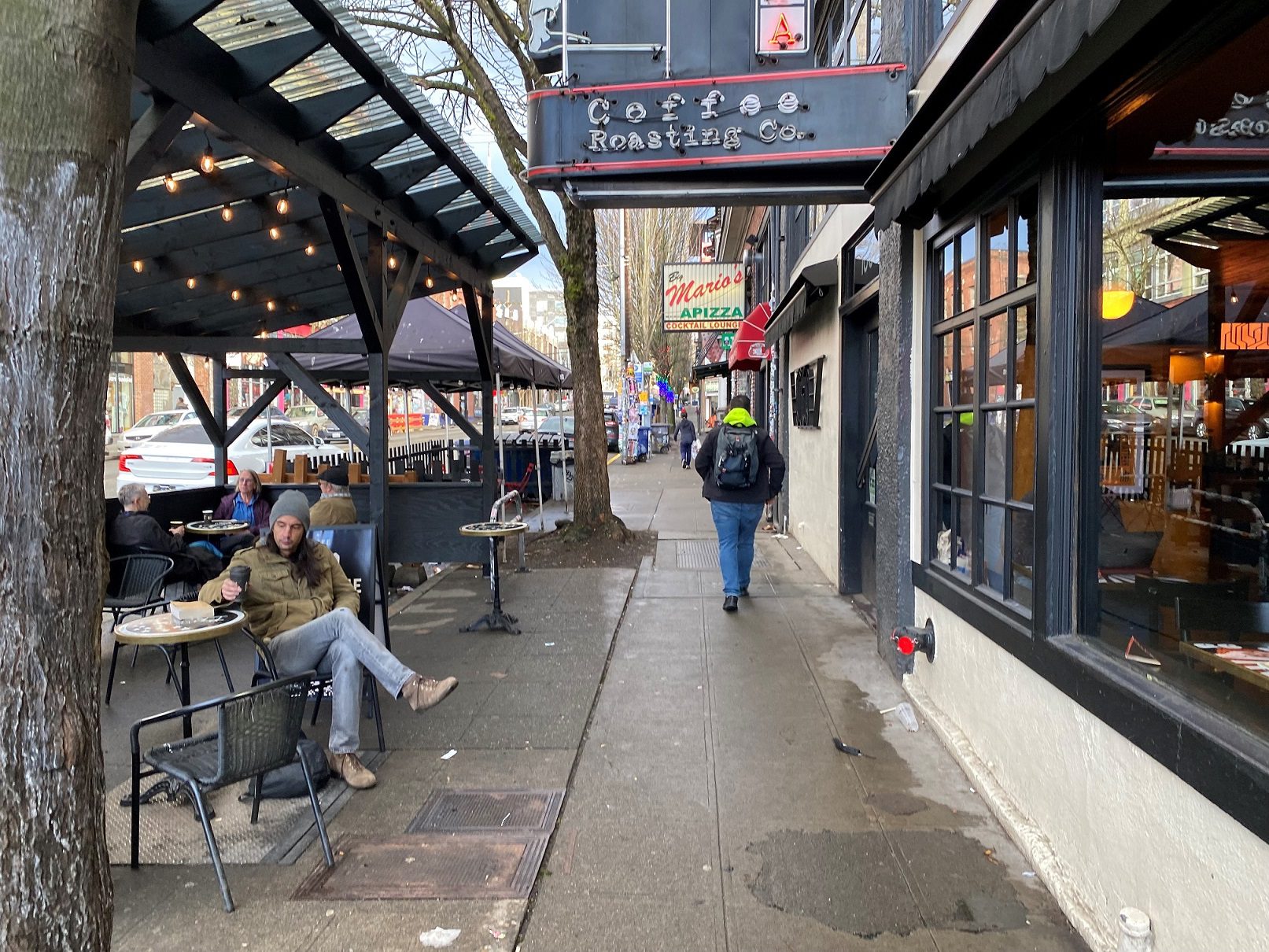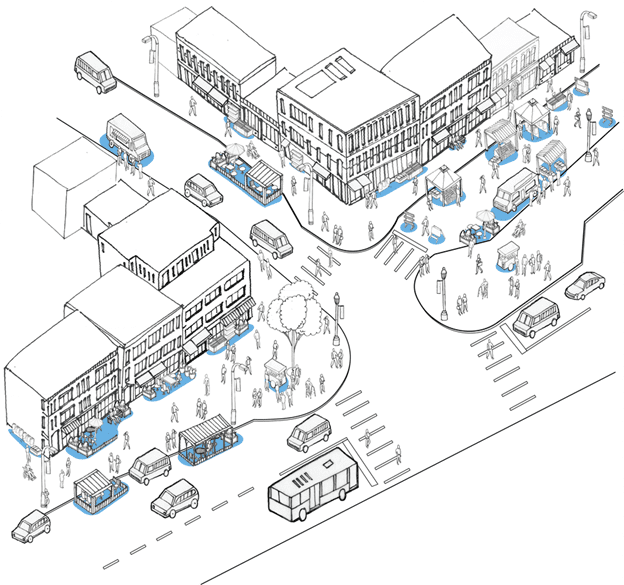 Outdoor dining and coffee-sipping space in Seattle’s Capitol Hill neighborhood. Photo credit: SDOT
Outdoor dining and coffee-sipping space in Seattle’s Capitol Hill neighborhood. Photo credit: SDOT Please note: This blog post is available in additional languages, via the links below. This includes Amharic, Chinese (Traditional), Korean, Somali, Spanish, Tagalog, and Vietnamese.
- የሚቀጥለው ለእኛ የ”ደህና ጅማሮ” (“Safe Start”) ከቤት ውጭ መመገቢያ እና የጠርዝ ቦታ ያለው የፍቃድ አጠቃቀም ፕሮግራም ምንድን ነው?
- 「安全啟動」(Safe Start)戶外和路邊空間使用許可計畫的下一步
- “Safe Start” 야외 식사 및 연석 공간 사용 허가 프로그램의 다음 계획은 무엇입니까?
- Maxaa ku soo kordhay barnaamijka fasaxa isticmaalka bannaanka lagu cunteeyo iyo isticmalka jidka lugta ee “Bilow Nabdoon”
- El siguiente paso para nuestro programa de permisos “Safe Start” para los comedores al aire libre y el uso del espacio de la acera
- Ano ang susunod sa Ating “Safe Start” na kainan sa labas at sa programa ng permiso sa paggamit ng espasyo sa gilid ng bangketa
- Cập nhật về chương trình giấy phép sử dụng không gian lề đường & ăn uống ngoài trời “Khởi Đầu An Toàn” (“Safe Start”)
In June 2020, we created the temporary Safe Start program to help Seattle restaurants, food vendors, and retail businesses during the COVID-19 pandemic. The Safe Start program made it simpler for businesses to get a permit to use the street and sidewalk. This allowed them to have more space to operate safely during the pandemic.
The program includes options for outdoor dining, vending, merchandise displays, and street closures. We have issued more than 275 permits under the Safe Start program. It is set to expire on January 31, 2023. You can read more in our blog post in February, when we announced this extension.
Before the pandemic, there were about 380 outdoor dining permits, 20 merchandise displays, and 180 vending permits. Most Safe Start permits are for outdoor dining, and over 60% of issued permits are in the curb space.

We created a draft proposal that includes long-term changes and updates to our permit requirements. If approved, we will put these changes in place once Safe Start expires early next year. We plan to complete our proposal this summer. You can find the basics on our proposals below.
Outdoor Dining
Our draft proposal will continue many of the successes seen during the pandemic. We will continue to allow outdoor dining with structures both along the edges of the sidewalk and in the curb space. Some structures may need to be altered or strengthened to withstand inclement weather. We will also expand opportunities for restaurants by offering a new, seasonal permit. This permit would be valid from April through October. It is ideal for businesses open for outdoor dining in the warmer months.
Visit our web page for information about the proposed outdoor dining changes.
Merchandise Displays
Our proposal allows retail businesses to advertise merchandise in front of their stores. This removes the need to apply for a permit.
The exemption does not apply to every display. Retail businesses that want to place a merchandise display near their stores, either at the edge of the sidewalk near the curb or directly outside their business next to their building, will still need to receive a permit if their display does not meet the standards created for the permit-free option. Businesses can apply for long-term and seasonal permits. The long-term permits renew annually. Seasonal permits are valid from April through October.
- We will no longer offer an option for merchandise displays located in the curb space. These displays have a low demand compared to other curb space uses under the Safe Start program. Exceptions may be necessary for street closures or other temporary, permitted events.
Visit our web page for information about the proposed merchandise display changes.
Vending
Our Street and Sidewalk Vending Program has grown steadily over time. It offers steady opportunities to new and established small businesses. We issue most of our vending permits for 12 months.
Adding opportunities for new vendors was challenging before the pandemic. Committing to an uncertain, new site for a full year can prove daunting, especially on limited resources. We incorporated a three-month trial permit to address this challenge. The permit’s timeframe and reduced cost supports vendors’ efforts to try out new locations. The idea comes from vendors who took part in a small vendor advisory group in 2021.
We are creating more vending opportunities by removing restrictions on types of vending, number of vendors, and zoning.
Visit our web page for information about the proposed vending changes.
Street and Sidewalk Activities
Our Street and Sidewalk Activity Permits allow institutions, community groups, and organizations to use our streets, alleys, and plazas. By enlivening these spaces, these activities strengthen our sense of community. During the pandemic, these permits were used to extra space for restaurants and retail stores to serve customers. As our communities adapt to the pandemic, these permits will once again broaden to include activities of many types.
Visit our web page for information about the proposed changes to Street and Sidewalk Activities.
Fees
There are no permit fees for permits issued through the temporary Safe Start program. Our goal was to support our communities as the pandemic disrupted our daily lives. Once the temporary program ends, we will resume charging fees for these permit types.
We learned a great deal about the businesses we serve since announcing the Safe Start program in 2020. We watched them work hard to balance the needs of their staff and their viability, both temporary and long-term. We saw local business owners take calculated risks, share ideas and plans, build on each other’s creativity and innovations, and work together during highly uncertain and difficult times. They made good use of the opportunities created by Safe Start permits, and they expressed their appreciation for this supportive program.
To build on what we’ve learned and address key considerations, we determined our 2023 Fees:
- Should be affordable for small business owners and community organizations. We want to continue to help our business partners as we rebuild our communities. We also want to center equity in our program.
- Should recover our costs through permit issuance, renewal, and modification fees. This will better tie fees to the work our staff performs when reviewing applications and issuing permits. It will also ensure long-term program sustainability.
- Should be as simple as possible. This will increase user-friendliness and aid efficient processing.
- Should represent our values. We want to encourage use of public space. To do this, our proposal adjusts permit fees so we can sustain the program while improving affordability.
To see details about the proposed fees, see these specific pages:
What’s next?
We are sharing this draft plan to get feedback from you. We also want to raise awareness about our plans as we work towards the final version of this proposal. We plan to submit our final proposal to City Council later this summer. If you have any feedback, questions, or want to learn more, please email us at publicspace@seattle.gov. You can also visit our website anytime, or view our July 19 presentation slides to City Council.
Frequently Asked Questions:
Question: I have a current Safe Start café. Can I keep the same size café?
Answer: That depends. If your café is over 40 feet in length, it might need to be a little smaller. This is so we can ensure there is space for vehicle loading and unloading. We also want to make sure that a neighboring business can use the curb space or sidewalk. However, there will be many instances where cafes longer than 40 feet can remain unchanged.
Question: I have a current Safe Start café with a roof structure. Can I keep it?
Answer: Again, it depends! We are happy to continue allowing overhead structures to protect people from Seattle’s rain and (occasional) sun. However, the structure may need to be stronger or weighted. This will help keep it in place when we have high winds.
Question: My Safe Start café or outdoor merchandise display uses a tent to protect people from rain and sun. Will you continue to allow that option?
Answer: Yes! Our program will continue to allow pop-up tents to protect people from rain and sun. We just ask that you remove the tent when a storm is expected.
Question: What about lighting and heating? Can I keep those in place?
Answer: Again, it depends. We want to make sure these spaces remain comfortable, which often means heat and lighting. Some common heating elements, like tall “mushroom-style” propane heaters, are only allowed if there is no roof or cover. Other, smaller propane heaters are allowed even under cover. Lights just need to conform to building code, and then they are allowed.
Question: I have a current Safe Start permit. Will I need to reapply?
Answer: Yes, you will need to reapply under the updated permit type. Our Safe Start program was very much designed as an emergency pandemic response. The Safe Start program was based on existing permit options. We are updating these existing permit options and will no longer issue Safe Start permits. With the updated permit types, we will need to make sure we are doing a thorough review of your café and make sure we have data we need. If your café was fully permitted under Safe Start (or even if it wasn’t) we will work do everything we can to approve your permit, but some changes may need to be made.